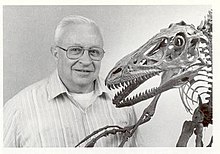John Ostrom
| John Ostrom | |
|---|---|

John Ostrom and Deinonychus skeleton cast. Photo courtesy Yale University.
|
|
| Born |
February 18, 1928 New York City, New York |
| Died | July 16, 2005 (aged 77) Litchfield, Connecticut |
| Nationality | American |
| Fields | Paleontology |
| Alma mater |
Yale Columbia Union College |
| Doctoral students | Robert T. Bakker |
| Known for | The "Dinosaur renaissance" |
| Notable awards | Romer-Simpson Medal (1994) |
John Harold Ostrom (February 18, 1928 – July 16, 2005) was an American paleontologist who revolutionized modern understanding of dinosaurs in the 1960s.
As first proposed by Thomas Henry Huxley in the 1860s, Ostrom showed that dinosaurs were more like big non-flying birds than they were like lizards (or "saurians").
The first of Ostrom's broad-based reviews of the osteology and phylogeny of the primitive bird Archaeopteryx appeared in 1976. His reaction to the eventual discovery of feathered dinosaurs in China, after years of acrimonious debate, was bittersweet.
He was born in New York and studied at Union College. He planned to be a physician like his father, but changed his mind after reading George Gaylord Simpson's book The Meaning of Evolution. He enrolled at Columbia University and studied with Edwin H. Colbert. The type species Utahraptor ostrommaysorum was named in his honour. In 1952 he married Nancy Grace Hartman (d. 2003) and he had two daughters: Karen and Alicia.
Ostrom taught for one year at Brooklyn College and then spent five years at Beloit College before going to Yale. Ostrom was a professor at Yale University where he was the Curator Emeritus of vertebrate paleontology at the Peabody Museum of Natural History, which has an impressive fossil collection originally started by Othniel Charles Marsh. He died from complications of Alzheimer's disease at the age of 77 in Litchfield, Connecticut.
...
Wikipedia
